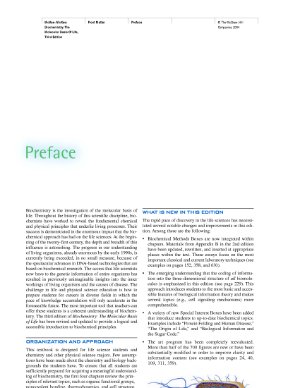3rd ed. - The McGraw-Hill Companies, 2004. – 771 p.
Biochemistry is the investigation of the molecular basis of life. Throughout the history of this scientific discipline, biochemists have worked to reveal the fundamental chemical and physical principles that underlie living processes. Their success is demonstrated in the enormous impact that the biochemical approach has had on the life sciences. At the beginning of the twenty-first century, the depth and breadth of this influence is astonishing. The progress in our understanding of living organisms, already enormous by the early 1990s, is currently being exceeded, in no small measure, because of the spectacular advances in DNA-based technologies that are based on biochemical research. The access that life scientists now have to the genetic information of entire organisms has resulted in previously unimaginable insights into the inner workings of living organisms and the causes of disease. The challenge in life and physical science education is how to prepare students for careers in diverse fields in which the pace of knowledge accumulation will only accelerate in the foreseeable future. The most important tool that teachers can offer these students is a coherent understanding of biochemistry. The third edition of Biochemistry: The Molecular Basis of Life has been revised and updated to provide a logical and accessible introduction to biochemical principles.
This textbook is designed for life science students and chemistry and other physical science majors. Few assumptions have been made about the chemistry and biology backgrounds the students have. To ensure that all students are sufficiently prepared for acquiring a meaningful understanding of biochemistry, the first four chapters review the principles of relevant topics, such as organic functional groups, noncovalent bonding, thermodynamics and cell struture.
Biochemistry is the investigation of the molecular basis of life. Throughout the history of this scientific discipline, biochemists have worked to reveal the fundamental chemical and physical principles that underlie living processes. Their success is demonstrated in the enormous impact that the biochemical approach has had on the life sciences. At the beginning of the twenty-first century, the depth and breadth of this influence is astonishing. The progress in our understanding of living organisms, already enormous by the early 1990s, is currently being exceeded, in no small measure, because of the spectacular advances in DNA-based technologies that are based on biochemical research. The access that life scientists now have to the genetic information of entire organisms has resulted in previously unimaginable insights into the inner workings of living organisms and the causes of disease. The challenge in life and physical science education is how to prepare students for careers in diverse fields in which the pace of knowledge accumulation will only accelerate in the foreseeable future. The most important tool that teachers can offer these students is a coherent understanding of biochemistry. The third edition of Biochemistry: The Molecular Basis of Life has been revised and updated to provide a logical and accessible introduction to biochemical principles.
This textbook is designed for life science students and chemistry and other physical science majors. Few assumptions have been made about the chemistry and biology backgrounds the students have. To ensure that all students are sufficiently prepared for acquiring a meaningful understanding of biochemistry, the first four chapters review the principles of relevant topics, such as organic functional groups, noncovalent bonding, thermodynamics and cell struture.

